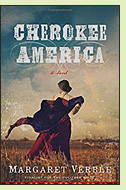Cherokee America
by Margaret Venable
Reviewed by Margaret Tomlinson

Cherokee
America is the name of a character in this novel, and also a statement about
the nature of the story. In the years after the Civil War, Cherokee memories
were only a few decades old of the "Trail of Tears," the forced
removal in the 1830s of Cherokees from their lands in the American Southeast westward
to Louisiana Purchase territory in what is now Oklahoma. The final forced march
in the winter of 1839 is estimated to have killed some 5,000 Cherokee.
In
the 1870s, resentment against the U.S. government lingered; but many Cherokee
had married white Americans, and a new mixed-race generation had grown up who lived
as Cherokee but had ties to white relations. Although fiction, Cherokee America was inspired by the
life of a real woman who befriended the author's grandmother, and the story
carries all the complexity of real Cherokee lives as they adapted to a new
situation and resisted U.S. government pressures to give up their tribal sovereignty
and adopt the customs of white America.
Cherokee America tells a sometimes hair-raising story of danger and struggle. "Chick," as the main character is called by her friends and family, is striving to raise her five sons to be strong and ethical men. Meanwhile, the husband she loves lies on his deathbed, her cook's husband has fathered an illegitimate child, and her second-eldest son's secret explorations are leading him into a dangerous and intensely shaming situation. Even with all this drama, much of the novel's fascination and depth comes from its depiction of the Cherokee culture in the 1870s. Here, in contrast to the white society pressuring it to abandon its traditions, women held considerable power and people bent over backward to respect each others' privacy. (2019; 385 pages including an Author's Note discussing the history behind the novel)
More about Cherokee America at Powell's Books or The Book DepositoryOther historical novels with Cherokee characters:
Mountain Windsong by Robert J. Conley (1992), about a young Cherokee man and woman separated by the Trail of Tears shortly before they are to be married. More info
Abraham’s Well by Sharon Ewell Foster (2006), about the black slaves of the Cherokee on the Trail of Tears. More info
Mary Coin by Marisa Silver (2013), about Florence Owen Thompson, the woman in Dorothea Lange's famous photograph of a Depression-era mother in Oklahoma. See review or more info at Powell's Books
Nonfiction about Cherokee history:
Cherokee Women: Gender and Culture Change, 1700-1835 by Theda Perdue (1998). More info
Trail of Tears: The Rise and Fall of the Cherokee Nation by John Ehle (1988). More info
Blood Moon: An American Epic of War and Splendor in the Cherokee Nation by John Sedgwick (2018). More info
Online:
History of the Cherokee Nation at the Cherokee Nation website
Back to Novels of the Old West
Back to Directory of Book Reviews